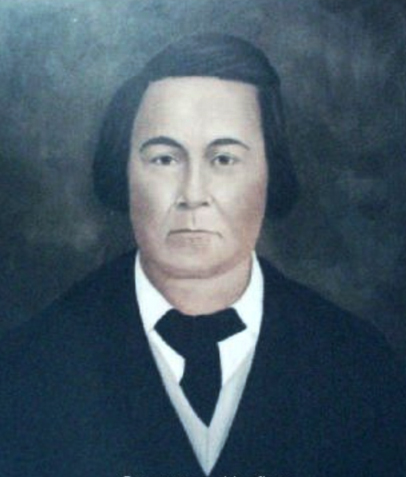- Greenwood LeFlore
Infobox Person

image_size =
caption = Greenwood LeFlore
birth_name =
birth_date = June 3, 1800
birth_place = LeFleur's Bluff
death_date = August 31, 1865
death_place =
death_cause =
resting_place =
resting_place_coordinates =
residence = Choctaw nation,Mississippi
nationality = Choctaw, American
other_names =
education = Educated by Major Donly in Nashville, Tn.
employer =
occupation =Tribal chief , planter and entrepreneur; Mississippi State Senate 1841-1844
title = Chief & State Senator
salary =
networth =
height =
weight =
term =
predecessor = Robert Cole, before Cole wasApuckshunubbee
successor =George W. Harkins
party =
boards =
religion =
spouse = 1st-Rosa Donley (12/4/1817), Priscilla Leflore
partner =
parents = Louis LeFleur and Rebecca Cravatt
children = William, Benjamin, Basil, Clarissa, Forbis, Jackson, Emily, and three other daughters.
relatives =
website =
footnotes =Greenwood LeFlore or Greenwood Le Fleur (
June 3 ,1800 –August 31 ,1865 ) was an American Indian/European-American leader of the Choctaws and was a Mississippi senator. A wealthy and regionally influential trader with many connections in state and federal government, he was elected chief of the entire Choctaw tribe shortly before theTreaty of Dancing Rabbit Creek , becoming the first Principal Chief of a Choctaw Nation that had previously been governed by regional chiefs. During the American Civil War he sided with the Union and lost most of his valuables.Background
LeFlore was a
half-breed son ofLouis LeFleur , a French trader and explorer from French Canada and a Choctaw woman Rebecca Cravat, niece ofPushmataha .cite book
last = Campbell
first = Will
title = Providence
origdate = 1992
url =
accessdate =
publisher = Long Street Press
location = Atlanta, Georgia
chapter =
chapterurl = ] At the age of twelve his father allowed him to go toNashville to become educated; although never popular with the full-blood tribesmen, he became a powerful man at an early age.Advocate of civilization
When Leflore was 22, he became the chief of the Western district of the
Choctaw Nation when it was still in Mississippi. On March 15, 1830 he became the head chief of the entire nation. He is credited for abolishing the Choctaw "blood for blood" law.LeFlore was a supporter of the civilization program that U.S. President George Washington and Henry Knox developed during their tenure. He encouraged Choctaws to find permanent residence, cultivate the land, convert to Christianity and send their children to be educated.
Removals
In treaty negotiations, LeFlore used his formidable personal political capital and position as head of a unified tribe not to oppose removal (which he regarded as inevitable), but to secure the largest and most desirable section of
Indian Territory land possible.In the event, the Choctaw were awarded the largest territory of any removed tribe, located in the fertile, forested southeast corner of what is now Oklahoma. LeFlore received one thousand acres (4 km²) of land in Mississippi for his part in the negotiations on the treaty, and he did not move to Indian territory with other Choctaws. LeFlore's accomplishments in unifying and strengthening the Choctaw people are still honored, but his pragmatic, bottom-line response to their removal from their ancestral lands was and remains controversial. Some Choctaws felt LeFlore wronged them because he was one of the leading chiefs involved in the treaty.
LeFlore as a U.S. citizen
In the 1840s, LeFlore was a
Mississippi representative and senator, a fixture of Mississippi high society, and a personal friend ofJefferson Davis . He represented his county in the house for two terms and served as a senator for one term.The
Latin language was a popular communication vehicle among the elite and was from time to time used in politics. LeFlore, in defense of his heritage, spoke in theChoctaw language and asked the floor which was better understood.Civil War
LeFlore spoke against succession. LeFlore's mansion was set on fire, but his slaves put it out. During the war he remained loyal to the Union. He refused to acknowledge the Confederate States of America and didn't pay taxes to its government.
During the Civil War, LeFlore lost his cotton, all his slaves, and other valuable property.
Malmaison
His Carroll County home,
Malmaison , burned in 1942. Only a few pieces of crystal, silver and chairs remain.Other facts
Greenwood and Leflore County in Mississippi and
Le Flore County, Oklahoma are named for him. The novelist James Street modeled two characters in his Dabney family saga on LeFlore.ee also
*
Apuckshunubbee
*Mosholatubbee
*Pushmataha
*George W. Harkins
*Peter Pitchlynn
*Phillip Martin
*List of Choctaw Treaties Citations
External links
* [http://www.vaiden.net/malmaison.html Greenwood LeFlore portrait and other images]
Wikimedia Foundation. 2010.
